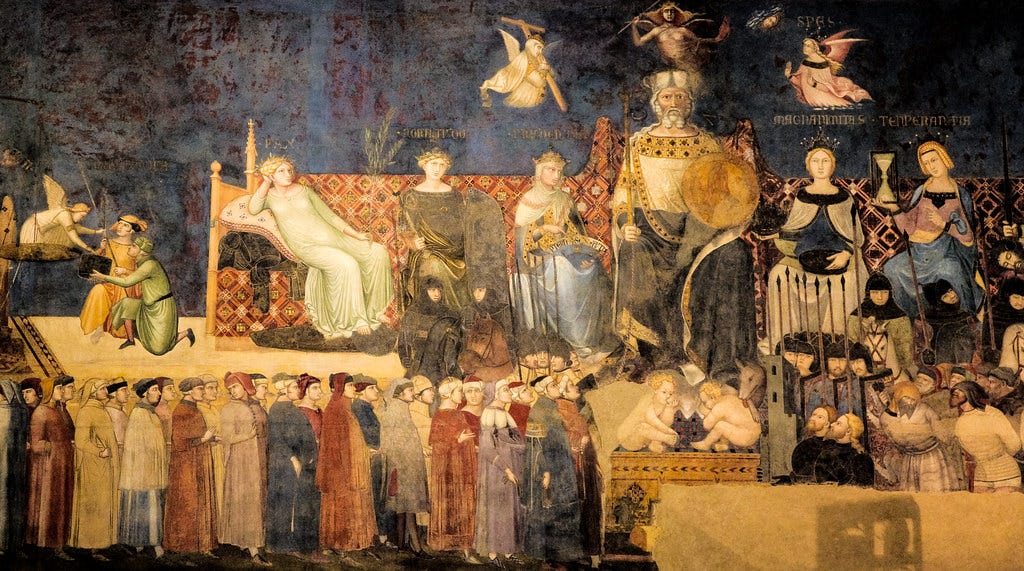The Classical Mind Newsletter for August 18, 2023
Aristotle on Friendship, "Allegory of the Good Government", Canon Schmanon, In Praise of Print, "Wisdom", and Trivial Authority
Housekeeping
Our episode on The Brothers Karamazov episode is out now!
Our next books are Oedipus Rex by Sophocles and Poetics by Aristotle. That episode will be released on September 5.
Reminder that Junius has a new book out: On Teaching Fairy Stories: A Guide to Cultivating Wonder in Students through Great Literature.
I got to chat with Lisa Nehring at True North Homeschool Academy about the importance of Latin, Logic, and virtue formation.
We have such a talented community of authors, poets, and thinkers who support the podcast and are active in our community chat here on Substack. If you would like to submit an essay, poem, or book review to this newsletter, please feel free to email me at wwalker@stpaulscrownsville.com!
Aristotle on Friendship
“The real miracle of Jesus is that he had 12 close friends in his 30s.” The joke is a testimony that, especially for us moderns, it can be difficult to make friends as an adult. At Classical Wisdom, they’re discussing what friendship is according to Aristotle. For him, friendship is “reciprocated goodwill between people for usefulness, pleasure, or goodness.” Usefulness and pleasure are not based on a love directed at the other person, they help oneself. It is good to befriend a co-worker or boss because it is more useful to be on good terms with those you work with, but they may not be the people you spend time with on the weekend and, once you or they leave that job, the friendship will most likely go dormant. Friendship based on goodness, however, is the key to an enduring relationship. This type of friendship is unique from the other two because “friends in this relationship wish goodness upon their friends for each other’s sake, and not because its right benefit themselves somehow.” I don’t think I’ve ever worked for a boss I’d go to prison for, but I absolutely would for some of my close friends! For good friends, we will put up with all sorts of things simply because we care about them.
“Allegory of the Good Government” by Ambrogio Lorenzetti
I was having a conversation with a friend about this piece this week. “Allegory of the Good Government” is part of a series commissioned by the city council of Siena. Above the figure seated on the throne are the three theological virtues of (right to left) hope, charity, and faith. The figure on the throne represents the city of Siena, the “common good.” Flanking him on both sides are virtues. From right to left, the virtues are Justice (sitting just off-screen), Temperance, Magnanimity (“greatness of soul”), Prudence, Fortitude, and Peace. Magnanimity and Peace are the “odd ones out” because they are not traditionally considered Cardinal Virtues. Magnanimity is often considered a precondition for virtue acquisition and a way to compound the goodness of the other virtues. I’m not sold on the idea that peace is being depicted as a virtue here. She is further away from the others, dressed differently, and in a relaxed posture. Thomas Aquinas did not consider peace a virtue (remember, a virtue is a disposition or habit of the soul towards the good) but an end, ultimately culminating in the Beatific Vision. I would interpret her as the goal or value of the other virtues. It’s also important to notice that she is resting on a suit of armor, perhaps a sign that peace can, at times, only be achieved through the state’s sword.



